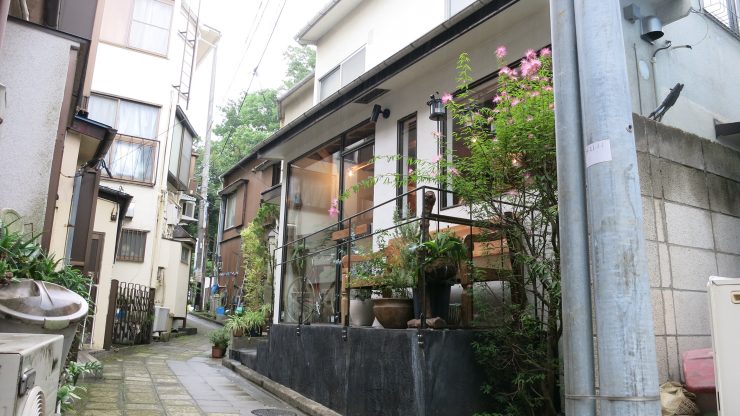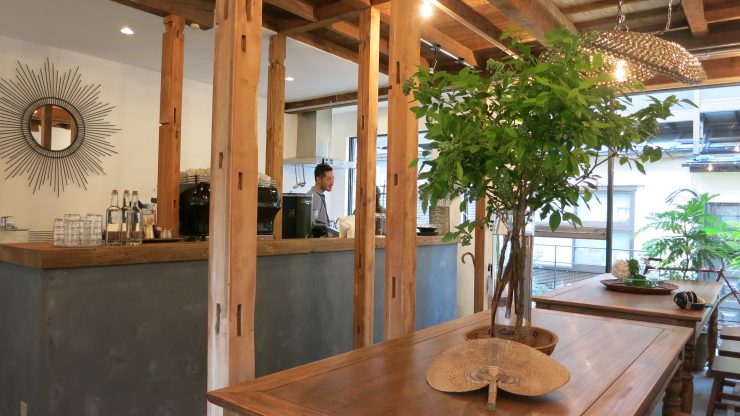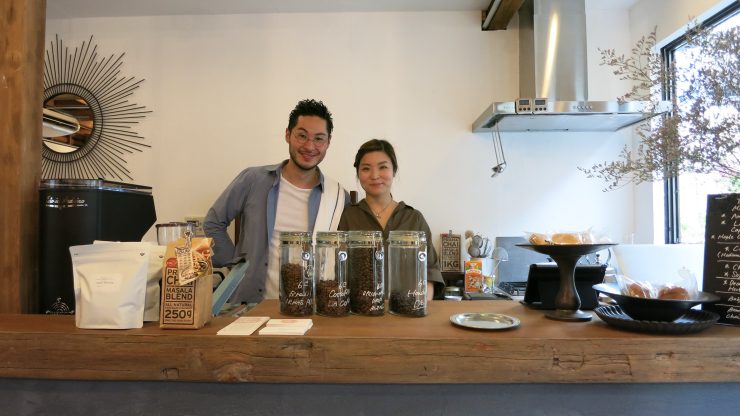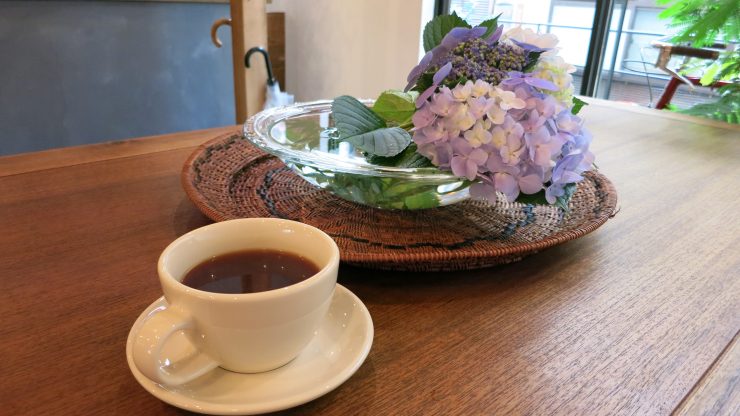Nem Coffee & Espresso was right there on my map, but quietly hidden.
I got out at Hiroo station, walked by a few local shops, and past the supermarket and florist. A light pitter-patter of rain fell on a few old buildings, and a simple black signboard leaned against one of them. “Nem” it said. It pointed down a narrow pathway between two buildings, and that’s where I found the cafe—squeezed in amongst a cluster of old houses, behind a local kindergarten.
I opened the clear glass door and peeked inside. There was a long wooden counter, a chocolate brown La Marzocco, and wooden tables and chairs set amongst a collection of plants and flowers. It felt tropical, somehow. Warm and inviting. A little bit secret.
Nem is home to Takumi and Akiyo Watanabe, and it’s the culmination of their mutual dream—a project some eight years in the making.
Between ducking back and forth to serve customers in need of coffee—a selection courtesy of Nakamura Coffee Roasters and Nozy Coffee, together with a house blend and Prana Chai—Akiyo Watanabe told me how it all started.
Takumi Watanabe began his journey from a furniture and interior design shop to entering the service industry, and learning barista work, his partner told me. She said each job was a step towards putting Nem together—he started with an interest in creating a particular space and then learned to fill that space with a crafted beverage that would bring people to it.
Akiyo Watanabe herself worked at Nozy Coffee and met Takumi Watanabe on her trips through Tokyo trying to better understand espresso. He was working at Saturdays Surf NYC in Daikanyama, and the two became friends, and then lovers, and then married. She pointed at some of the chairs, and the long plank of wood that makes up the counter, and some of the plants, and told me that much of it was bought long before the cafe opened. Much of what the cafe would be, she said, was decided before they even found a space for it.
Akiyo Watanabe said the name comes from the silk tree–called nemunoki in Japanese—and what it symbolizes: peace of mind and joy and harmony between lovers. She told me people often see the silk tree as something that opens during the day to soak in the sun, but hides over the evening to rest. The sleep of the silk tree, she said, is like the image of a couple retiring for the evening, and cuddling into slumber. It was fitting imagery for the rhythm they wanted to create at the cafe they now ran.
That story, told by anyone else in any other setting, would have felt cheesy, or saccharine. At that moment, though, it simply fit.
The Watanabes live on the second floor of the building. On quiet days, you can hear their dog scampering around upstairs. Akiyo Watanabe said they were lucky to find the space, and that the landlord thought a cafe was a great idea. They completely redesigned the first floor and built the place they had dreamed of opening.
Nem struck me as a modern interpretation of the kissaten—a quiet third space designed for the local community, built around the idyllic dreams of its owners, and with a contemporary approach to brewing and serving coffee.
There’s a harmony and peace of mind to Nem that makes it easy to relax. Though it isn’t easy to put your finger on, it feels like the result of many small decisions made to create a very particular experience. The furniture, the plants, the music, the coffee—it’s like you get a sense for what Nem is all about without anyone needing to tell you.
And it makes a fine place to enjoy a cup of coffee.
Hengtee Lim (@Hent03) is a Sprudge.com staff writer based in Tokyo. Read more Hengtee Lim on Sprudge.
The post Nem Coffee & Espresso: A Hidden Gem In Tokyo appeared first on Sprudge.
seen 1st on http://sprudge.com



No comments:
Post a Comment